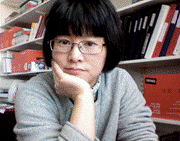BU CTSI Supports Transition from Early Career toward Independent Investigator Career Stage
Since 2008, the BU Clinical and Translational Science Institute (BU CTSI) has been supporting BU investigators with their translational research through a variety of services, resources and funding opportunities. To support an internal mechanism for pilot awards, the BU CTSI partners with the department of Medicine, BMC Claude D. Pepper Older Americans Independence Center, Center for Nanotechnology and Nanobiotechnology, School of Public Health, and Office of Technology Development to create an integrated pilot program for BU investigators. “Alignment and timing of these integrated pilot grant opportunities is intended to catalyze research efforts of our investigators across the university and also increase their opportunities for attracting external funding,” states David Center, MD, Associate Provost for Translational Research and Director of the BU CTSI.

Xuemei Zhong, PhD, an assistant professor in the department of Medicine, is an early career investigator whose research was further advanced with an award from the BU CTSI Pilot Program. In 2009, following previous foundation awards, she received a pilot award co-funded by the BU CTSI and department of Medicine for her study, “The Effects of Thymic Infiltration of B Cells on Central Immune Tolerance in a Murine Lupus Model.”
“This study is an example of the pilot program’s commitment to supporting early career investigators, including fellows and trainees, who often have fewer resources available to them in establishing externally funded research careers. We are working to address this need identified by our investigators,” explains George O’Conner, MD, Director of the BU CTSI Pilot Program.
Zhong, who completed her PhD and a postdoctoral fellowship in Immunology/Pathology at Boston University, has been successful studying B cell immunology for nearly a decade. She finds that the immune system has a very sophisticated self-regulating and self-correcting network that has not yet been fully appreciated by modern medicine. “As an immunologist, my quest is to understand how the immune system re-organizes itself in response to crisis as well as how it cleans up and heals after the crisis,” Zhong explains. “If a crisis cannot be resolved within a short period of time, we need to look into our own body to see what is hampering the immune system doing its job or if our immune system is over-burdened.”
Since her BU CTSI pilot award in 2009, Zhong’s research has progressed with interdisciplinary collaborations with Drs. Ian Rifkin, associate professor of Medicine (Nephrology), and Susan Fried, professor of Medicine (Endocrinology, Diabetes, and Nutrition), along with their respective labs. The findings from her pilot project, coupled with her previous work, have catalyzed subsequent internal and external grant awards. Zhong received a R03 Small Grant Award in 2010 and most recently a R21 Exploratory/Developmental Grant Award in 2012 from the NIH, as well as a follow-up pilot grant from the Department of Medicine in 2011. The additional funding has supported the evolution of Zhong’s research from studying B cell activity and effects in a murine lupus model that has led to a better understanding of the role of B cells in autoimmune disorders, to examining the role of B cells in abdominal obesity and diet-accelerated atherosclerosis in systemic lupus erythematosus. Her research could lead to more effective therapeutic interventions for lupus, including restoration of atheroprotective natural antibodies, and diet-induced obesity concerns in general.
For more information about Dr. Zhong, including her publications, see her researcher profile. Visit the BU CTSI website for information about the integrated pilot program and other translational research resources.